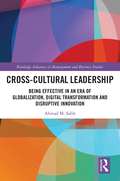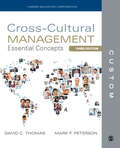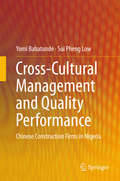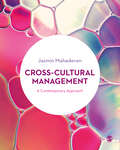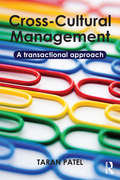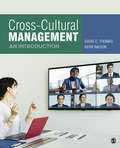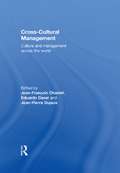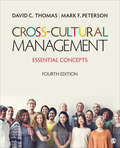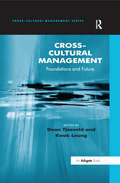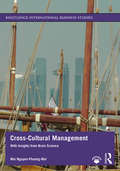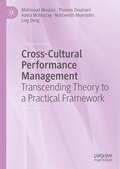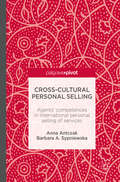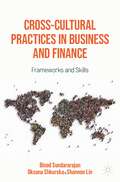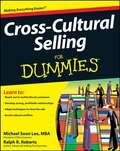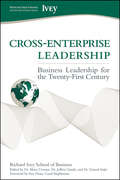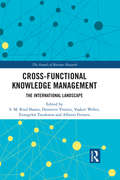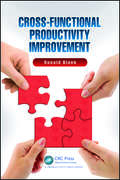- Table View
- List View
Cross-Cultural Leadership: Being Effective in an Era of Globalization, Digital Transformation and Disruptive Innovation (Routledge Advances in Management and Business Studies)
by Ahmad M. SalihFor many decades, management in its research and practice has been in need of an alternative approach and paradigm to understanding human behaviours. Many studies and books have attempted to provide solutions to the individual, which ended up being a cultural dilemma with little success. This book provides a novel approach to address this dilemma by linking aspects from three knowledge domains; Psychology, Anthropology and Sociology. Cross-Cultural Leadership supports Cultural Intelligence (CQ) and makes it a practical construct and tool that both managers and researchers harness to understand what "cultural Chameleon" means. The book also renders support to Douglaisan Cultural Framework (DCF) by activating the role of the usually neglected fifth culture; the hermit by linking it to the metacognitive dimension of CQ. This link introduces for the first time the mechanism that individuals use to run through metacognitive processes to drive change. This book is a tool for individuals to help them work efficiently outside their homeland. Being an adaptive or culturally hybrid leader is among the most important competencies of the effective leaders in the 21st century. By focusing on comprehending the five cultures as elaborated in DCF, leaders and managers will be relieved from the dilemma of having to understand each and every national culture of their employees. This book will be of value to researchers, academics, managers, and students with an interest in leadership, management, organization studies, globalization, and innovation
Cross-Cultural Management (Custom CEC Third Edition)
by David C. ThomasCross-Cultural Management: Essential Concepts introduces readers to the fundamentals of cross-cultural management by exploring the influence of culture on interpersonal interactions in organizational settings and examining the ever-increasing number of cross-cultural management challenges that global managers face in today’s workplace. Instead of taking a country specific approach, authors David C. Thomas and Mark F. Peterson offer a predominantly psychological perspective—focusing on the interactions of people from different cultures in organizational settings. This approach shows readers the effects culture has on a wide variety of cross-cultural interactions across organizational contexts.
Cross-Cultural Management and Quality Performance: Chinese Construction Firms in Nigeria
by Sui Pheng Low Yomi BabatundeThis book explores China's global competitiveness in the building of infrastructures with a particular interest in the resource-rich African countries. The book begins with a comprehensive literature review on total quality management (TQM) and national culture, followed by reviews of the construction industries in China and Nigeria. This provides better understanding of the linkages between TQM, based on the International Organization for Standardization's ISO 9000 quality management systems (QMS), and national culture, based on Emeritus Professor Geert Hofstede's national cultural dimensions. Premised on the culture-specificity and bi-directionality relationships between TQM and national culture, this book investigates the construction industries in China and Nigeria including their strengths, weaknesses, opportunities, and threats (SWOT) as well as an appraisal of their historical and emerging relationships. In its conceptual approach, this book presents different models in the lead up to its primary theoretical contribution of a quality management assessment model (QMAM) that was adopted during the study's field work. The book also presents relevant lessons relating to cross cultural management and quality performance not only to the Nigerians but also other foreign players in Nigeria's construction industry.
Cross-Cultural Management: A Contemporary Approach (Routledge Studies In International Business And The World Economy Ser. #1)
by Jasmin MahadevanThis timely textbook is contemporary and comprehensive in its coverage of Cross-Cultural Management, and unique in its approach which fosters a multi-paradigmatic mindset among readers; embraces problem-based and experiential learning; and acknowledges the many diverse identities of cross-cultural managers. Part I provides an overview on how Cross-Cultural Management emerged and why it is unique, and Part II integrates the functionalist, interpretive and critical perspectives underpinning it. Part III transfers this learning to areas of application, including international business, organizations, technology and social media, and Part IV focuses on key skillsets such as developing your managerial competencies and designing your own research. Each chapter is brought to life via an opening case study, and readers are invited to complete a variety of activities throughout chapters. Afterwards, the opening case is revisited, and a closing activity introduces the next area of learning. This textbook is essential reading for higher education students, educators and researchers alike, and will also be of interest to business and management practitioners. It can be used as a central text for university and college courses on and related to Cross-Cultural Management, International Business and general intercultural competencies. Jasmin Mahadevan is a Professor of International and Cross-Cultural Management at Pforzheim University, Germany.
Cross-Cultural Management: A Contemporary Approach (Routledge Studies In International Business And The World Economy Ser. #1)
by Jasmin MahadevanThis timely textbook is contemporary and comprehensive in its coverage of Cross-Cultural Management, and unique in its approach which fosters a multi-paradigmatic mindset among readers; embraces problem-based and experiential learning; and acknowledges the many diverse identities of cross-cultural managers. Part I provides an overview on how Cross-Cultural Management emerged and why it is unique, and Part II integrates the functionalist, interpretive and critical perspectives underpinning it. Part III transfers this learning to areas of application, including international business, organizations, technology and social media, and Part IV focuses on key skillsets such as developing your managerial competencies and designing your own research. Each chapter is brought to life via an opening case study, and readers are invited to complete a variety of activities throughout chapters. Afterwards, the opening case is revisited, and a closing activity introduces the next area of learning. This textbook is essential reading for higher education students, educators and researchers alike, and will also be of interest to business and management practitioners. It can be used as a central text for university and college courses on and related to Cross-Cultural Management, International Business and general intercultural competencies. Jasmin Mahadevan is a Professor of International and Cross-Cultural Management at Pforzheim University, Germany.
Cross-Cultural Management: A Transactional Approach
by Taran PatelThe internationalization of business via the process of globalization has brought issues of culture to the forefront of management thinking. Although culture is by no means a new area of study in business schools, it remains frustratingly elusive and misunderstood. This textbook gives business students - or future managers - an understanding of the multitude of frameworks available to them to make sense of the cultural contexts they will encounter in their managerial careers. Starting from a general introduction to ‘culture’ and its role in businesses, Taran Patel encourages readers to shed a critical eye on the commonly accepted frameworks. She compels readers to ask three questions: Can I only make sense of the variety of cultures around me by categorizing people into static categories based on their geo-ethnic identities? Is it valid to make sense of people’s behaviours by categorizing them as ‘French’, ‘Indian’, ‘German’ or ‘American’? What other ways are there to make sense of people and their behaviours? Students studying from this textbook will benefit from a variety of conceptual tools that can be used to navigate the world of culture and its intersection with business and management. Taran Patel's unique textbook will be core reading for students of cross-cultural management / intercultural communication and essential reading for all those studying or researching international business and management.
Cross-Cultural Management: An Introduction
by David C. Thomas J. H. InksonCross-Cultural Management: An Introduction offers students a hands-on approach to cross-cultural management that they can apply to a wide variety of organizational contexts. Rather than focusing on specific countries, authors David C. Thomas and Kerr Inkson highlight the interactions of people from different cultures in organizational settings to provide students with practical applications of concepts in international management. Real-world examples and case studies help students understand and integrate differences between attitudes, values, beliefs, and assumptions so that they can thrive as managers.
Cross-Cultural Management: An Introduction
by David C. Thomas J. H. InksonCross-Cultural Management: An Introduction offers students a hands-on approach to cross-cultural management that they can apply to a wide variety of organizational contexts. Rather than focusing on specific countries, authors David C. Thomas and Kerr Inkson highlight the interactions of people from different cultures in organizational settings to provide students with practical applications of concepts in international management. Real-world examples and case studies help students understand and integrate differences between attitudes, values, beliefs, and assumptions so that they can thrive as managers.
Cross-Cultural Management: Culture and Management across the World
by Jean-François Chanlat Eduardo Davel Jean-Pierre DupuisAll cultures appear to share the belief that they do things ‘correctly’, while others, until proven otherwise, are assumed to be ignorant or barbaric. When people from different cultures work together and cannot take shared meanings for granted, managers face serious challenges. An individual’s parsing of an experience and its meaning may vary according to several cultural scales – national, professional, industrial and local. Awareness of cultural differences and the willingness to view them as a positive are therefore crucial assets. This edited textbook sets itself apart from existing cross-cultural management texts by highlighting to the reader the need to avoid both ethnocentrism and the belief in the universality of his or her own values and ways of thinking: the success of international negotiations and intercultural management depends on such openness and acceptance of real differences. It encourages the development of ‘nomadic intelligence’ and the creative use of a culture’s resources, according to a symbolic anthropology perspective. Through the essays and case studies in the chapters, readers will become aware of the intercultural dimension of business activities and better understand how they affect work. Cross-Cultural Management will help interested parties – students of business management, international relations and other disciplines, and business managers and other professionals – develop their ability to interact, take action and give direction in an intercultural context.
Cross-Cultural Management: Essential Concepts (Sage Library In Business And Management)
by David C. Thomas Mark F. PetersonCross-Cultural Management: Essential Concepts, Fourth Edition introduces readers to the fundamentals of cross-cultural management by exploring the influence of culture on interpersonal interactions in organizational settings and examining the ever-increasing number of cross-cultural management challenges that global managers face in today’s workplace. Instead of taking a country specific approach, authors David C. Thomas and Mark F. Peterson offer a predominantly psychological perspective—focusing on the interactions of people from different cultures in organizational settings. This approach shows readers the effects culture has on a wide variety of cross-cultural interactions across organizational contexts.
Cross-Cultural Management: Essential Concepts (Sage Library In Business And Management)
by David C. Thomas Mark F. PetersonCross-Cultural Management: Essential Concepts, Fourth Edition introduces readers to the fundamentals of cross-cultural management by exploring the influence of culture on interpersonal interactions in organizational settings and examining the ever-increasing number of cross-cultural management challenges that global managers face in today’s workplace. Instead of taking a country specific approach, authors David C. Thomas and Mark F. Peterson offer a predominantly psychological perspective—focusing on the interactions of people from different cultures in organizational settings. This approach shows readers the effects culture has on a wide variety of cross-cultural interactions across organizational contexts.
Cross-Cultural Management: Foundations and Future (Cross-Cultural Management)
by Dean TjosvoldAcademics worldwide need empirically developed, concise ideas to make their cross-cultural teams and organizations productive. This invaluable reference tool provides an essential resource for academics to develop their understanding and professional practice in working across cultural boundaries. It considers the fundamental theories and frameworks of cross-cultural management and deepens our understanding of how they can be applied to management knowledge. Managers, researchers, students, HRM practitioners, and specialists in international business and cross-cultural affairs, will find this book a valuable reference source. Chapters suggest how frameworks can be further developed and how managers and employees can put them to use so as to build cross-cultural understanding and productive cross-functional teams.
Cross-Cultural Management: With Insights from Brain Science (Routledge International Business Studies)
by Mai Nguyen-Phuong-MaiCross-Cultural Management: With Insights from Brain Science explores a broad range of topics on the impact of culture in international business and vice versa, and the impact of businesses and individuals in shaping a culture. It provides critical and in-depth information on globalization, global/glocal leadership, cross-cultural marketing, and cross-cultural negotiation. It also discusses many other topics that are not typically found in the mainstream management textbooks such as diversity management, bias management, cross-cultural motivation strategies, and change management. While most literature in the field is dominated by the static paradigm, that is, culture is fixed, nation equates to culture, and values are binary, this book takes a different approach. It regards national values as a first-best-guess and balances it with an introduction of the dynamic paradigm. This school of thought posits that culture is not static, context is the software of the mind, opposing values coexist, change is constant, and individuals can develop a multicultural mind. A unique feature of this book is the contribution of an interdisciplinary approach. It’s the first textbook of cross-cultural management that incorporates latest findings from the emerging discipline of cultural neuroscience and evolutionary biology in the discussion. Such a holistic approach is meant to help readers gain a deeper and broader understanding of the subjects.
Cross-Cultural Marketing: Theory, practice and relevance
by Dawn BurtonCross-cultural marketing is an important element of the contemporary business environment. Many conventional accounts of the topic have conflated cross-cultural and cross-national marketing, but in this groundbreaking, new book, Burton argues that these generalizations have little meaning given the extent of multi-culturalism in many societies. Given the importance of new emerging markets in the Far East, Middle East, Asia and Latin America, this book raises important questions about the applicability of existing marketing theory and practice, which was originally developed using the model of Western society. An extensive range of cross-cultural marketing issues is addressed, including: Cross-cultural consumer behaviour Cross-cultural management practice Promotional strategies Product development Distribution Marketing research methods Cross-cultural Marketing offers a new, more complex and sophisticated approach to the important challenges for existing marketing theory and practice and their continued relevance for stakeholders. As such, it is an invaluable text for students of international and cross-cultural marketing, as well as for practitioners who wish to assess new developments in the field.
Cross-Cultural Performance Management: Transcending Theory to a Practical Framework
by Nuttawuth Muenjohn Adela McMurray Mahmoud Moussa Thomas Doumani Ling DengThe book’s foundations informing its content are anchored to evidence-based primary data, which was collected in the Thailand context utilising interview and case study techniques. The data has been internationally scrutinized by our peers to validate its truthfulness and integrity. In this way, our book sheds reliable and valid new understandings on the complex relationship between performance management and the effects of culture. The book transcends beyond conceptual discussions as it is anchored to evidence-based data to inform the direct or obvious cultural value differences exploring the very concept of efficacy and how culture impacts on the way in which we perceive what constitutes the pursuit of efficacious outcomes in managing employees. Therefore, this novel research design offers integrated insights from practitioners, and academics, in the field of management within organisations from various Thai industry contexts.
Cross-Cultural Personal Selling: Agents’ Competences in International Personal Selling of Services
by Anna Antczak Barbara A. SypniewskaProviding in-depth analysis, this book enables readers to understand the theoretical aspects of personal selling and explores the difficulties of selling services which are sensitive to cultural, age and gender differences, and to customers originating from diverse cultural zones. Agents and personal sellers must be aware of these differences and be familiar with the expectations of customers. Cross-cultural Personal Selling provides extensive empirical research results with special emphasis on competences, skills and qualifications of personal sellers which are necessary for successful, effective and efficient promotion campaigns aimed at customers from different cultures. Academics of international marketing and promotion will find this study extremely useful, as well as practitioners looking to expand their knowledge on personal selling.
Cross-Cultural Practices in Business and Finance: Frameworks and Skills
by Binod Sundararajan Oksana Shkurska Shannon LinThis textbook explains the effects of culture on business practices and introduces students to the cross-cultural and international dimensions of working internationally, exploring topics across both business and finance. Given that doing business across cultures has become the norm in modern companies, managers must develop and acquire the skills to lead effectively in cross-cultural contexts. This textbook will help you to attain those skills through its practical and situational examples involving countries and regions around the world while learning about the cultural and business practices of people from different backgrounds, ethnicities, diversities, educational levels, and social strata and hierarchies. It covers important aspects of doing business across cultures/countries, such as the role (and importance) of technology adoption, different organizational forms, financial and accounting approaches in different parts of the world, negotiating practices, ethics across the globe, and working and studying abroad. Further, it equips readers with useful knowledge about cross-cultural nuances beyond the usual discussions of high vs. low contexts, power distance, uncertainty avoidance, and such dimensions of cross-cultural interactions.The varied experiences of the authors – having lived and worked in many countries – along with their backgrounds in linguistics, communication, and financial accounting provide unique perspectives not available elsewhere. With its case studies, end-of-chapter exercises, as well as multiple-choice and short-answer questions, this broad, yet thorough textbook will guide you in leading with cultural intelligence.
Cross-Cultural Selling For Dummies
by Ralph R. Roberts Michael Soon LeeWant to reach out to multicultural customers? Cross-Cultural Selling For Dummies is packed with everything you need to know to tap into multicultural markets, from establishing solid relationships to adapting your advertising to meeting the needs of your new clientele. You'll acquire key cross-cultural skills and build a coordinated effort that engages all aspects of your business.This practical, easy-to-understand guide shows you how to measure the purchasing power of other cultures and change the way you market to them. You'll learn how to do multicultural research, develop a marketing campaign with wide appeal, pick the right media, tune your materials to the market, and establish a presence in the community. You'll find tips on identifying generational differences with in a culture, pronouncing names correctly, and determining customer motivation. Discover how to:Reach out to multicultural customersDevelop strong relationshipsAdapt your sales presentations and techniquesClear language barriersBoost your street credPresent appealing financing optionsCreate a foundation for long-term successHandle negotiations with skilled hagglersRecognize and overcome objectionsAdopt techniques to close the saleCreate a strong referral baseAvoid cultural conflictsMaintain a diverse sales teamYou can realize the incredible untapped potential of the multicultural market to send your sales soaring and your profits off the charts. Cross-Cultural Selling For Dummies shows you how!
Cross-Disciplinary Impacts on Insurance Law: ESG Concerns, Financial and Technological Innovation (AIDA Europe Research Series on Insurance Law and Regulation #8)
by Simon Grima Margarida Lima RegoThis book explores the insurance sector’s potential role, influence, and impact on society in light of new environmental, social, and governance (ESG) concerns. Furthermore, it looks into how financial and technological innovations help reshape insurance regulation and business models. Unlike their predecessors, 21st century insurers have a growing impact on cross-sector service provision by making available to their clients a wealth of expert knowledge and experience in data analytics. The book delves into insurers’ transition from suppliers of products – consisting of risk coverage or investment opportunities – to providers of various services, and ultimately to solution providers by partnering with their clients so as to prevent failure, optimize their clients’ operations and help them excel in their economic sector. Insurance regulations and policies can be affected by various factors, such as changes in the economy, technological advances, and shifting consumer preferences, to name a few. Additionally, the insurance industry can have a significant bearing on the wider economy, making it important for the industry to operate within a framework of comprehensive regulations.This book includes a diverse set of theoretical, empirical, and policy-oriented chapters on particular aspects of new trends and wider analyses leading to a more systematic understanding of the industry’s socio-economic role. It offers a mixture of chapters from insurance academics and professionals from different countries, cultures, and scientific backgrounds. The methodologies used are diverse, including legal, sociological, historical, economic and financial as well as interdisciplinary analyses. The book has a global scope, including chapters of a more global nature and others addressing particular jurisdictions on different continents, including Europe, Asia and North America.
Cross-Driven Institutional Resilience: Case Studies of Good Governance in Europe during the Covid-19 Pandemic
by Throstur Olaf Sigurjonsson Saulė Mačiukaitė-Žvinienė José M. Ruano Alina Georgiana Profiroiu Kosjenka DumančićThis book presents a series of studies on organizations across Europe, displaying new perspectives on institutional resilience of affected governance structures during crisis. Such an approach to governance studies not only aims to provide readers with conceptual and practical knowledge on crisis experience of organizations, but also to equip them with necessary cognitive tools to perform well in a similar crisis context in the future. The book highlights knowledge on institutional resilience and delivers an enduring resource for researchers and students on a time of unprecedented crisis. Cross-national/sectorial interdependences in Europe are multiplying, while institutional reaction and international collaboration mechanisms are falling behind. The studies presented here aim to shape a conceptual understanding of students, academics, and practitioners considering these contemporary challenges and opportunities. They provide a valuable resource in the field of governance, sustainability, crisis management, innovation, and leadership.
Cross-Enterprise Leadership
by Carol Stephenson Richard Ivey School of Business, TheIn today's world of business where organizational boundaries are blurry, intense competition dictates rapid change, and complex issues and relationships cut across departments, business units, and even companies, the old hierarchical command-and-control management approach is no longer sufficient. Distributed leadership approaches are necessary and no one individual can do it all.In fact, an enterprise is more than just the traditional organization. Value today is often created not just within a company, but also across a network of companies. Being able to connect the various components and to work collaboratively within the network is essential to maintaining competitive advantage. Leaders today must be capable of identifying potential partners, initiating and maintaining relationships, resolving conflicts, and reconfiguring their relationships. Cross-Enterprise Leadership is a new model for success in today's world of complexity and ambiguity. Leaders who adopt this approach will be more comfortable dealing with ambiguity, uncertainty, complexity and time pressures, and with creating value through networks of relationships.Small, domestic, entrepreneurial companies are, by their very nature, cross-enterprise focused. Entrepreneurs will tell you that they live in a world of uncertainty and ambiguity and that they constantly need to adjust on the fly. Equally, large multi-national companies like Wal-Mart, Nestle, or Coca-Cola are inherently complex and issues and relationships cut across functions, levels, geographies, and companies.Cross-Enterprise Leadership goes beyond a functional perspective to understanding the complexity of business issues from all angles and how they can be integrated, how leaders can rely almost entirely on influence when they may be operating without power or authority, and how they can develop the capacity to make decisions and implement them in an environment filled with uncertainty and complexity.Most managers operate like the traditional orchestra-waiting to do their written part. But there is no tidy score for business today. CEL enables today's leaders to be more like a jazz band, improvising and building off of one another, creating music in real time and in relationship to one another.
Cross-Functional Knowledge Management: The International Landscape (The Annals of Business Research)
by Demetris Vrontis Yaakov Weber Evangelos Tsoukatos S.M. Riad Shams Alberto FerrarisDiverse kinds of knowledge are vital for each organization that would successfully compete today in an international scenario. The emergent relevance of knowledge and its management in an even more complex environment opens up the possibility to analyze, investigate and deepen our understanding on different aspects related to several functional areas in business management. Nowadays, firms that create new knowledge and apply it effectively and efficiently will be successful at creating competitive advantages. The choices of the firms in selecting and applying different knowledge process (such as knowledge sourcing, transferring and exploiting) as well as knowledge tools may be crucial. Thus, the role of knowledge as the key source of potential advantage for organizations and indeed whole economies is still a hot debate in the international landscape. This book develops insights for the management of knowledge in cross-functional business areas to originate an innovative approach to the classical Knowledge Management (KM) field. This book provides a fresh perspective on different knowledge related topics in an international landscape, highlighting the key role of knowledge and its management in business activities. Overall, the primary aim of this book is to extend our understandings on how KM can be helpful in several cross-functional management areas, such as strategic management, finance, HRM and innovation as well as in different business circumstances such as M&A, internationalization processes and risk management.
Cross-Functional Productivity Improvement
by Ronald BlankUsing language that is easy to understand, Cross-Functional Productivity Improvement describes how improvement efforts can be undermined by errors and incompleteness. It illustrates the various types of errors that can hurt productivity and outlines proven solutions to prevent or correct them. Explaining how departments not directly related to manufacturing can hinder productivity, it provides time-tested advice on how to reduce waste and enhance efficiency.The book starts with an overview of traditional productivity improvement methods. Subsequent chapters explain how different departments can affect productivity and describe what must be done to improve productivity. Supplying time-tested procedures for implementing cross-functional productivity actions that are applicable across a wide range of industries, the text describes the problems caused by incorrect Lean manufacturing, material flow, efficiency, ergonomics, quality policies, issues of malpractice, and counterproductive procedures. Includes many figures, illustrations, and tables that provide the technical information needed to implement sustainable productivity improvements Addresses the problems often caused by incorrect Lean manufacturing and issues of malpractice Includes an extensive glossary and a list of suggested readings to help readers further explore productivity improvement Readers will gain a clear understanding of exactly what to do and what not to do in all aspects of company operations to maximize productivity through a cross-functional approach. Furthermore, the book will enable companies to take better advantage of all that the ISO 9001 and similar systems have to offer by making best use of the interactions between the various elements of company operations.
Cross-Functional Productivity Improvement
by Ronald BlankUsing language that is easy to understand, Cross-Functional Productivity Improvement describes how improvement efforts can be undermined by errors and incompleteness. It illustrates the various types of errors that can hurt productivity and outlines proven solutions to prevent or correct them. Explaining how departments not directly related to manufacturing can hinder productivity, it provides time-tested advice on how to reduce waste and enhance efficiency.The book starts with an overview of traditional productivity improvement methods. Subsequent chapters explain how different departments can affect productivity and describe what must be done to improve productivity. Supplying time-tested procedures for implementing cross-functional productivity actions that are applicable across a wide range of industries, the text describes the problems caused by incorrect Lean manufacturing, material flow, efficiency, ergonomics, quality policies, issues of malpractice, and counterproductive procedures. Includes many figures, illustrations, and tables that provide the technical information needed to implement sustainable productivity improvements Addresses the problems often caused by incorrect Lean manufacturing and issues of malpractice Includes an extensive glossary and a list of suggested readings to help readers further explore productivity improvement Readers will gain a clear understanding of exactly what to do and what not to do in all aspects of company operations to maximize productivity through a cross-functional approach. Furthermore, the book will enable companies to take better advantage of all that the ISO 9001 and similar systems have to offer by making best use of the interactions between the various elements of company operations.
Cross-Functional Rapid Response Teams: Harnessing the Power--Rapid Transformation
by Behnam TabriziCross-functional rapid response teams are often considered the heart of the transformation effort. This chapter introduces the concept of these teams and explains their crucial role in the overall transformation effort, highlighting some important advantages to implementing rapid response teams.
